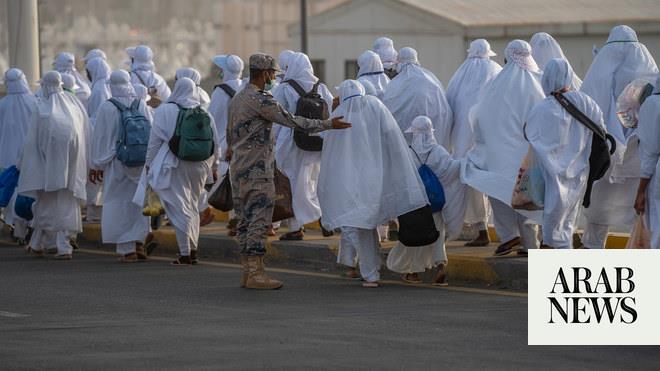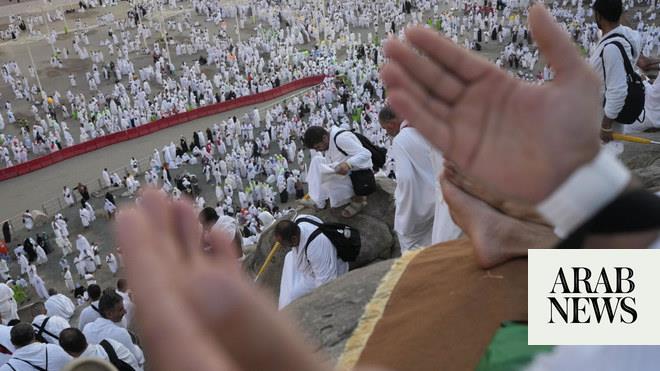
MINA — Amid strict coronavirus pandemic protocols, Hajj pilgrims have begun their lifetime spiritual journey by converging on the tent city of Mina since this morning.
To mark the beginning of the annual pilgrimage, the pilgrims performed Tawaf Al-Qudum (tawaf of arrival) and the ritual of sai at the Grand Mosque in Makkah on Wednesday morning and then headed to Mina, located 7 km northeast of the Grand Mosque.
Deputy Minister of Hajj and Umrah Dr. Abdul Fattah Mashat announced the success of completing the rituals of tawaf and sai as pilgrims followed social distancing and other precautionary measures approved by the Ministry of Health and implemented by the Ministry of Hajj and Umrah and other security and service sectors in the wake of the outbreak of the coronavirus pandemic. A health leader has been assigned to each group of 50 pilgrims to ensure safety measures, including wearing a mask and social distancing, are implemented at all times.
The men pilgrims, in seamless white ihram clothes and women pilgrims in abayas, embarked on the first day of their Hajj journey after finishing four days of isolation in Makkah and prior to that a weeklong quarantine at home, as part of the strict preventative health measures to guard against COVID-19. Prior to heading to Mina to embark on their Hajj journey, pilgrims enter the state of ihram, where they prepare themselves spiritually and don special white garments.
At the outset of Hajj, they headed first to Meeqat Al Sail Al-Kabeer (Wadi Muharram) to enter the state of ihram and profess intent. They then reached Makkah and performed Tawaf Al-Qudum, the initial Tawaf carried out upon entering the Grand Mosque.
Following the noble tradition of Prophet Muhammad (peace be upon him), the pilgrims will spend the day and night on Wednesday, which is known as the Tarwiyah Day (Day of quenching thirst), in Mina. On the Day of Tarwiyah, the pilgrims intend to make the pilgrimage in the heart, and recite Talbiyah, a prayer invoked as a conviction that they intend to perform the Hajj only for the glory of Allah. On the day and night of Tarwiyah Day, they engage in supplications and make final preparations for the Standing (wuqoof) at Arafat, the most important pillar of Haj, marking the climax of the annual pilgrimage on Thursday.
Deputy Minister Mashat said that the approved health criteria are strictly being enforced for the pilgrims in their places of accommodation and buses. The Ministry of Hajj and Umrah provided housing for pilgrims in the residential towers in Mina after taking precautions and preventive measures. He said pre-prepared meals will be provided to pilgrims for which one of the reputable companies has been assigned to distribute them among all pilgrims in their accommodation, buses, and waiting areas.
He said, in coordination with the Ministry of Health and the security authorities, the pilgrims will be transported from Mina to the Namira Mosque in Arafat on Thursday, to listen to the sermon of Arafat and the performance of the prayers of Dhuhr and Asr combined and in a shortened form, and then they will perform the main ritual of wuqoof in their tents.
The pilgrimage this year is limited to citizens and expatriates of Saudi Arabia, who meet preset conditions and have been subjected to quarantine procedures. Individuals from 160 nationalities residing in the Kingdom have been selected to perform the Hajj. Expatriates in Saudi Arabia make up 70 percent of the total number of pilgrims while citizens represent the remaining 30 percent. The number of pilgrims for this year’s Hajj has been dramatically reduced to ensure social distancing and other COVID-19 protocols are adhered to.
The General Presidency for the Affairs of the Two Holy Mosques has completed the installation and equipping of dedicated paths at the Grand Mosque, especially in mataf (circumambulation area around the Holy Kaaba) and mas’a (area for the ritual of sai between Safa and Marwah), for each group of pilgrims in a way maintaining all the regulations stipulated in the coronavirus preventive protocols for the Hajj.
The mataf and mas’a are being sterilized before and after the performance of tawaf and sai rituals by each and every group of pilgrims. Barriers and ground stickers were placed to define the paths of movement of pilgrims in a safe and hygienic way and to ensure that this is implemented through close monitoring by the supervisors. Thermal cameras were installed at the designated doors for the entry of pilgrims to the holy mosque.
Meanwhile, Grand Mufti and Chairman of the Council of Senior Scholars Sheikh Abdulaziz Alu Asheikh lauded the efforts made by the governmental and private sectors to serve the guests of God in light of the exceptional circumstances caused by the pandemic. He thanked Custodian of the Two Holy Mosques King Salman and Crown Prince Muhammad Bin Salman for their utmost keenness to safeguard the health and safety of the pilgrims.
In a related development, the Civil Defense Forces raised the degree of their preparedness and readiness in Mina to receive the pilgrims with taking all the measures to ensure their safety throughout their presence in the tent city. Maj. Gen. Dr. Hamoud Al-Faraj, commander of the Civil Defense Forces, said that all the Civil Defense units and teams are well geared up to carry out their mission in line with the Hajj emergency plan of the Civil Defense.












